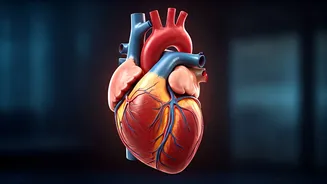Heart Rate & Activation
The disruption of the circadian rhythm can significantly influence your cardiovascular system, with a notable impact on heart rate. When your sleep-wake
cycle is thrown off, this can trigger a cascade of effects, including an elevated heart rate. This elevated heart rate can place extra strain on the heart, potentially increasing the risk of cardiovascular problems over time. Furthermore, the autonomic nervous system, which regulates bodily functions like heart rate and blood pressure, also becomes imbalanced. This imbalance can lead to fluctuations in heart rate, making it more difficult for the cardiovascular system to function efficiently. The body's internal clock, also known as the circadian rhythm, orchestrates various physiological processes, including those related to cardiovascular health. When this clock is disrupted, it leads to a series of adverse effects, including an increased risk of heart disease.
Cardiovascular Disease Risk
Disrupting your circadian rhythm significantly heightens the chances of developing cardiovascular disease. The interplay between sleep, metabolism, and heart health is delicate, and when one element is compromised, the others suffer. Chronic sleep disturbances, common with circadian rhythm disruptions, trigger various physiological responses that negatively affect the heart. For example, poor sleep can increase inflammation throughout the body, a key factor in the development of atherosclerosis, the buildup of plaque in arteries. Furthermore, disrupted sleep patterns can lead to increased blood pressure, a well-established risk factor for heart attacks and strokes. This disruption may also affect the body's ability to regulate blood sugar, increasing the risk of diabetes, another major contributor to cardiovascular disease. The cumulative effects of these issues create a perfect storm for cardiovascular problems, underlining the critical need to prioritize healthy sleep habits.
Glucose & Metabolic Issues
The body's ability to regulate glucose and maintain a healthy metabolism is closely linked to its sleep-wake cycle. When the circadian rhythm is disrupted, it can lead to impaired glucose metabolism, meaning the body struggles to process sugar effectively. This can result in elevated blood sugar levels, increasing the risk of insulin resistance and, eventually, type 2 diabetes, a major risk factor for cardiovascular disease. The metabolic processes that occur during sleep are essential for maintaining overall health. During deep sleep, the body repairs and regenerates tissues, regulates hormones, and processes the energy consumed during the day. Disrupted sleep interferes with these processes, leading to metabolic dysfunction. This can affect how the body breaks down fats, stores energy, and controls hunger and satiety signals, all of which impact heart health. By disrupting the natural rhythms of metabolic function, a disordered circadian rhythm sets the stage for various cardiovascular problems.
Protecting Your Heart
To safeguard your heart from the harmful effects of circadian rhythm disruption, adopting healthy sleep habits is paramount. Creating a consistent sleep schedule is vital; aim to go to bed and wake up around the same time each day, even on weekends, to regulate your internal clock. Ensure your bedroom is conducive to sleep by making it dark, quiet, and cool. Light exposure, especially before bed, can suppress melatonin production, a hormone crucial for sleep regulation. Consider using blackout curtains or an eye mask if necessary. Limit screen time before bed, as the blue light emitted from electronic devices can interfere with your sleep. Prioritize relaxation by establishing a calming bedtime routine; this might include taking a warm bath, reading a book, or listening to soothing music. Regular physical activity, especially earlier in the day, can also promote better sleep, but avoid strenuous workouts close to bedtime. The consistent practice of these habits can considerably improve sleep quality and, subsequently, protect your heart.

















